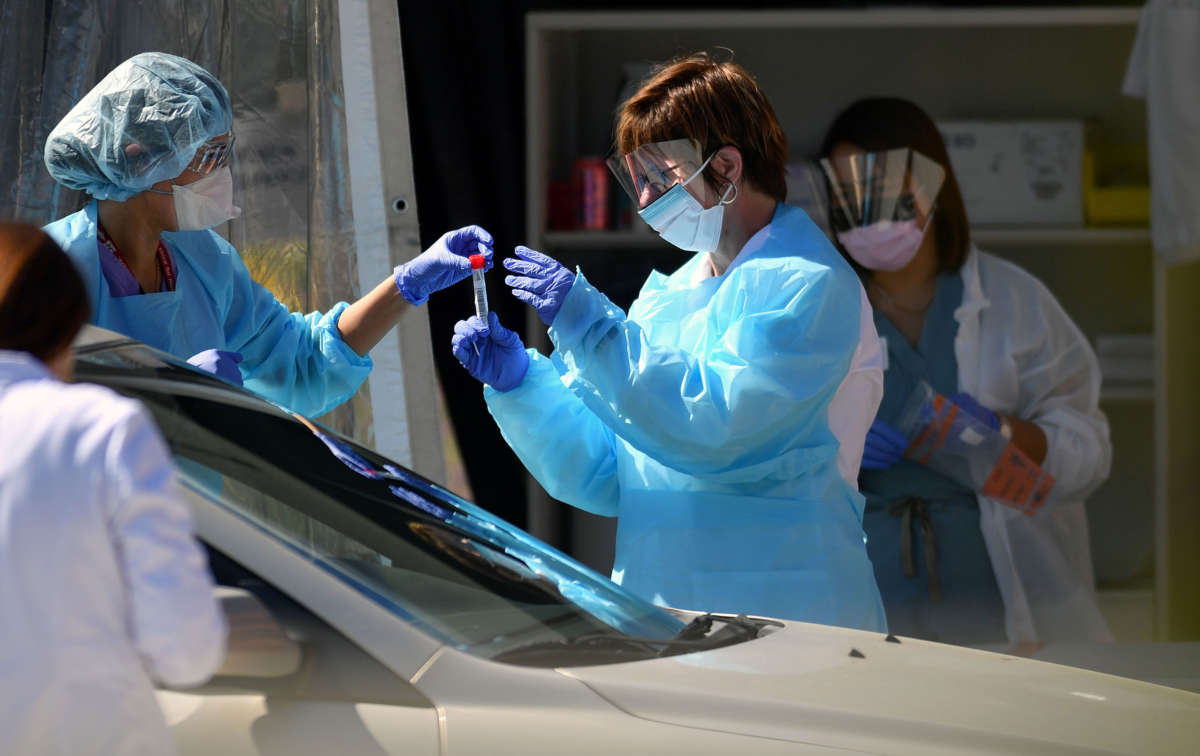Honest, paywall-free news is rare. Please support our boldly independent journalism with a donation of any size.
The biggest college in Norway urged students to return from countries with “poorly developed” health systems — such as the United States! — as experts warned that the American hospital system would be overwhelmed by the COVID-19 pandemic.
Norway’s University of Science and Technology issued an alert to students studying abroad urging them to “return home.”
“This applies especially if you are staying in a country with poorly developed health services. This also applies for countries with poorly developed collective infrastructure, for example the USA, where it can be difficult to get transport to the airport if you don’t have a car,” said the alert, which appears to have been deleted but is still visible on the archived version of the page. “The same applies if you don’t have health insurance.”
This Norwegian university is recommending overseas students return to Norway. The guidance "also applies for countries with poorly developed collective infrastructure, for example the USA…" pic.twitter.com/TnscoR3XfS
— Dr. Seema Yasmin is on a media literacy mission (@DoctorYasmin) March 15, 2020
The statement came as Norway, which has reported more than 1,000 confirmed COVID-19 cases, took drastic actions in response to the pandemic. The country closed its airports to all foreign citizens and will require its citizens to be quarantined for 14 days after returning from overseas. The country also shuttered schools and colleges, most bars and restaurants, and banned most public events.
The Trump administration has banned foreign citizens traveling from Europe and other parts of the world affected by the outbreak and announced new airport screening procedures. But the move resulted in hours-long waits that forced Americans to be stuck in large crowds after returning from countries where the virus has spread widely. There has been no federal attempt to restrict public gatherings or shutter businesses although most large cities and numerous states have announced public event bans and closures of schools, restaurants, bars and other public venues.
While Europe, where most developed countries have universal health care, has struggled to contain the outbreak, medical experts worry that the U.S. is uniquely ill-equipped to respond to a pandemic that is projected to infect between 160 million and 214 million people.
“Even in this early phase, public health experts say the single-payer, state-run systems are proving themselves relatively robust,” The Washington Post reported. “Unlike the United States, where a top health official told Congress the rollout of testing was ‘failing’ and where Congress is only now moving through a bill that includes free testing.”
Dr. David Himmelstein, distinguished professor of public health at the City University of New York at Hunter College, said that the United States’ “fragmented system” leaves “public health separate and disconnected from medical care, and provides no mechanism to appropriately balance funding priorities.”
“As a result, public health accounts for less than 3 percent of overall health expenditures, a percentage that has been falling for decades, and is about half the proportion in Canada or the U.K.,” he said. “One result is that state and local health departments that are the front lines in dealing with epidemics have lost 50,000 positions since 2008 due to budget cuts.”
While access and affordability could significantly hamper the country’s ability to respond to the pandemic, a bigger problem may be the seemingly inevitable breakdown of the U.S. hospital system.
“Without immediate action, the imminent failure of hospital systems is all but certain,” New York Gov. Andrew Cuomo said in a New York Times op-ed urging the Trump administration to use the Army Corps of Engineers to build makeshift hospitals.
The U.S. has fewer than one million staffed beds, a lower rate than countries like Italy, where bed and ventilator shortages have led doctors to ration care and decide who lives or dies. The number of deaths in Italy has exploded in recent days as overwhelmed hospitals have struggled to handle the quickly growing caseload. According to the Centers for Disease Control and Prevention, anywhere from 2.4 million to 21 million people in the United States may require hospitalization due to the virus.
New York state, where the number of cases has continued to rise sharply, is at particular risk, Cuomo said. There are only about 3,200 ICU beds in the state. There are only about 5,000 ventilators in New York City, 80% of which are already in use.
“This is where Italy got into trouble,” Cuomo said last week. “They didn’t have enough ICU beds to handle the number of patients who needed intensive care. That is going to be a problem in this state and in this country.”
“We are not prepared to deal with a rapid and severe surge of patients — we’re just not,” Dr. Christopher Tedeschi, an emergency room physician who teaches at Columbia University Medical Center, told The New York Times. “We’re sort of planning for what’s going on right now, and we’re trying to make up for lost time, but I’m not sure we’re planning for a month from now, or even two weeks from now.”
Dr. Demetre Daskalakis, the deputy commissioner for disease control at New York City’s Department of Health and Mental Hygiene, told doctors last week that they may have to choose who lives and who dies, like doctors in Italy.
“If things get crazier, you have to think about triaging the use of ICU beds and ventilators,” he said. “Really deciding who needs them and who doesn’t, and making some very serious difficult decisions.”
Media that fights fascism
Truthout is funded almost entirely by readers — that’s why we can speak truth to power and cut against the mainstream narrative. But independent journalists at Truthout face mounting political repression under Trump.
We rely on your support to survive McCarthyist censorship. Please make a tax-deductible one-time or monthly donation.
